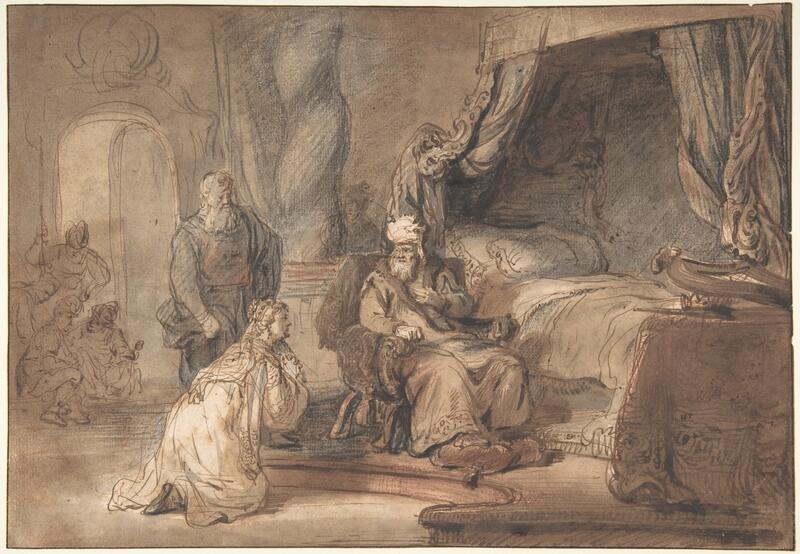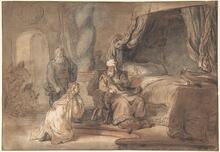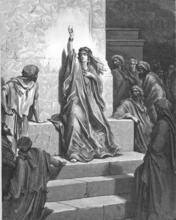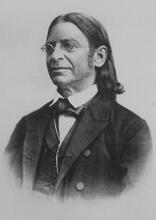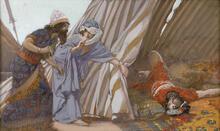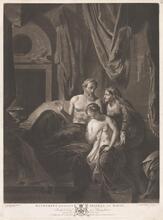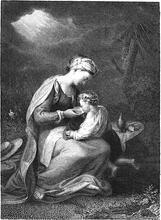Bathsheba: Midrash and Aggadah
As in the Bible, Bathsheba plays a secondary role in the midrashim about her husband, King David, and her son, King Solomon. Though her thoughts and feelings are never mentioned, she is never punished for her and David’s relationship, which implies that the rabbis viewed her as a righteous, guiltless woman. The rabbis further emphasize that God forgave David for his sin against Bathsheba’s husband Uriah, and endorsed David’s marriage to Bathsheba. During Solomon’s life, the rabbis portray Bathsheba as a positive influence on Solomon, rebuking him when he strayed from righteousness.
Bathsheba is portrayed by the A type of non-halakhic literary activitiy of the Rabbis for interpreting non-legal material according to special principles of interpretation (hermeneutical rules).midrash as a modest woman who carefully observed the laws of family purity, but who found herself, without any conscious action on her part, in an adulterous affair with the king. The Rabbis are concerned with the causes and harsh consequences of David’s sin, but completely disregard Bathsheba’s desires or thoughts. Many dicta present David’s grief at the sin that he committed and the heavy price that this exacted. Bathsheba is not punished nor does she ask for forgiveness, thus indicating her guiltlessness in the eyes of the Rabbis. The midrashim repeatedly emphasize that God forgave David for his sin, and thereby endorse his marriage to Bathsheba. According to another homiletical approach, Bathsheba had been designated as David’s wife during the six days of Creation; the fact that her son Solomon continued the royal dynasty of the Davidic line cleared David and Bathsheba of any reproach.
The midrash also examines Bathsheba’s role as the mother of Solomon, the heir to the throne. Her standing did not diminish after David’s death, and she continued to educate her son, reproaching him for his unseemly behavior when he drank to excess and married the daughter of Pharaoh. The rabbis apply to Bathsheba the verse from the “Woman of Valor” poem (Prov. 31:22): “She makes covers for herself; her clothing is linen and purple,” since she bore Solomon, who was dressed in linen and purple, and ruled from one end of the world to the other (Midrash Mishlei 31:22).
Bathsheba, A Fitting Wife for David
According to the Rabbis Ecclesiastes 4:9 describes the marriage of David and Bathsheba: “Two are better than one.” Bathsheba was a fitting wife for David, and had been thus designated already in the week of Creation, but she came to him through suffering [resulting from sin]. Another approach concurs that she had been appointed for David during the six days of Creation, but “he enjoyed her as an unripe fruit,” that is, he married her before the proper time, when the fruit [the fig] was still unripe. He rather should have waited until she was ready for him, after the death of Uriah (BT Sanhedrin 107a). This exposition is based on a wordplay, since, in the Rabbinic period, bat sheva was the name of an especially fine type of fig (see Codification of basic Jewish Oral Law; edited and arranged by R. Judah ha-Nasi c. 200 C.E.Mishnah Ma’aserot 2:8).
The Sin of David and Bathsheba
The (Aramaic) A work containing a collection of tanna'itic beraitot, organized into a series of tractates each of which parallels a tractate of the Mishnah.Tosefta establishes that the Biblical account of the sin of David and Bathsheba is one of the passages that are not read in the public readings from the Torah she-bi-khetav: Lit. "the written Torah." The Bible; the Pentateuch; Tanakh (the Pentateuch, Prophets and Hagiographia)Torah and the Prophets (haftarot), nor are they rendered into the vernacular [i.e., Aramaic] before the public. Notwithstanding this, the teacher may read these verses in the usual manner in which he teaches verses of Scripture (T. Lit. "scroll." Designation of the five scrolls of the Bible (Ruth, Song of Songs, Lamentations, Ecclesiastes, Esther). The Scroll of Esther is read on Purim from a parchment scroll.Megillah 3:38). The Tosefta apparently finds value in teaching the story, from which we can learn something, but deems a public airing unsuitable; it should rather be studied in the more intimate context of a teacher’s lessons to his pupils.
The midrash asserts that the affair of David and Bathsheba was a trial that David brought upon himself, and which he failed. David asked: “Master of the Universe! Why is it said [in prayer]: ‘the God of Abraham, the God of Isaac, and the God of Jacob,’ but not ‘the God of David’?” God replied: “I put the Patriarchs to the test, and they withstood My trials, but I did not put you to the test” (BT Sanhedrin 107a–b). According to another tradition, David asks God: “Why is it said [in prayer] ‘the shield of Abraham,’ and not ‘the shield of David’?” To which God replied: “I put Abraham to ten tests, but I did not try you” (Midrash Tehillim [ed. Buber], 18:25). David said to Him: “Master of the Universe! ‘Probe me, O Lord, and try me’ (Ps. 26:2).” God responded: “I will try you, and I will grant you a boon that I did not afford them. I did not inform the Patriarchs with what I would try them, but you I tell that I will try you with a sexual matter.” When David heard how he would sin, he changed his night couch to a day couch (i.e., he engaged in intercourse during the day, so that he would be sated and not have sinful thoughts about any woman). It is therefore said (II Sam. 11:2): “Late one afternoon, David rose from his couch,” for it was then that he arose from intercourse. The Rabbis note that when he acted so, he forgot one fact: man has a small organ that when fed becomes hungry [and desires more], but when starved is satisfied (BT Sanhedrin 107a). His lying with his wives that day was of no avail, and so when he saw Bathsheba in the afternoon he nevertheless lusted after her.
The midrash portrays Bathsheba as a modest woman and relates how she washed her hair under a bucket, hidden from all. David was walking about on the roof when Satan came and appeared to him as a bird. David shot an arrow at the bird, but the bird flew away, and the arrow hit the bucket and broke it. Thus Bathsheba was revealed to David as she was bathing (BT Sanhedrin 107a). This exegesis is most likely based on Ps. 11:1–2 [which is attributed to David], that describes how the upright fall under the arrows of the wicked: “How can you say to me, ‘Take to the hills like a bird! For see, the wicked bend the bow, they set their arrow on the string to shoot from the shadows at the upright.’” In the midrashic tale, Satan embodies the wicked one, whose arrows ensnare the upright David and cause him to sin. An arrow striking home is a recurring motif in world literature, used to depict sudden and uncontrollable falling in love. Thus, David’s hitting the bucket behind which Bathsheba was concealed symbolizes his unbridled falling in love with her. His inability to hit his initial target (the bird) represents his inability to withstand the trial that he undertook.
The Rabbis assert that God punished David for the Bathsheba episode. David sealed his own fate when he said (II Sam. 12:6): “He shall pay for the lamb four times over,” and was penalized by the death of four of his children: the first child born to Bathsheba, Amnon, Tamar [who was raped], and Absalom. David also suffered personally as part of this divine recompense: he was afflicted with leprosy for six months, the Sanhedrin separated from him, and the Shekhinah (Divine Presence) departed from him (BT The Day of Atonement, which falls on the 10th day of the Hebrew month of Tishrei and is devoted to prayer and fasting.Yoma 22b).
The midrash presents an event that preceded the David and Bathsheba episode and that revealed the former’s weakness. When Abigail, wife of Nabal the Carmelite, came to David clandestinely to plead for the lives of her family (I Sam. 25), David fell thrall to her beauty and could not overcome his lust, despite her being a married woman. Abigail took a resolute stand against David’s advances, thereby saving him from sin. Abigail told him (v. 31): “Do not let this be a cause of stumbling. When she said “this,” she prophetically foretold that he would stumble in another episode, that of Bathsheba (BT Megillah 14a-b). David had not yet ascended the throne in the encounter with Abigail, he was a man without possessions and was in flight from Saul, in danger of his life. Abigail was a woman of high station and power and therefore could resist him. In the David and Bathsheba episode, however, the balance of power was reversed. David was the all-powerful monarch, while Bathsheba was the wife of one of his subordinates and hence incapable of offering any resistance.
In contrast with the prevalent view that perceives David as sinning with Bathsheba, a contrary approach maintains that David was blameless and that whoever claims that he sinned is in error. The Lit. "teaching," "study," or "learning." A compilation of the commentary and discussions of the amora'im on the Mishnah. When not specified, "Talmud" refers to the Babylonian Talmud.Talmud relates that Rabbi Judah the Prince, who was descended from the Davidic line, sought to defend David: he argued that when Nathan the prophet reproached David, telling him (II Sam. 12:9): “Why then have you flouted the command of the Lord and done what displeases Him?”, he chastised him about something that he wanted to do, but did not commit. (David might have intended to sin, but his actions did not exceed the bounds of the The legal corpus of Jewish laws and observances as prescribed in the Torah and interpreted by rabbinic authorities, beginning with those of the Mishnah and Talmud.halakhah). David did not engage in adultery, because it was customary during the monarchy of the Davidic line for a man to write a conditional writ of divorce for his wife when he set out for war, which stipulated that, if he were to die in battle, his wife would be retroactively divorced from the time of his departure for the battlefield. This practice was meant to prevent women from becoming agunot (“chained” women barred from remarrying). Since Uriah had prepared such a writ of divorce for Bathsheba and he was killed in the fighting, Bathsheba was no longer a married woman when David had sexual relations with her. Furthermore, since Bathsheba was then unmarried, this act of intercourse constituted an act of marriage. Despite its unseemly nature, the act did not formally constitute a transgression. Nor did David commit any crime in the death of Uriah, since the latter was rebellious. He did not obey David when the king ordered him to go down to his house, but rather refused, arguing (II Sam. 11:11): “My master Joab and Your Majesty’s men are camped in the open,” and the mastery of another is not to be mentioned before the king. Uriah was deemed to be rebellious against David, a crime punishable by death, even without being tried before the Sanhedrin, as was the accepted procedure (BT SabbathShabbat 56a). The Talmud presents this attempt to exonerate David as tendentious, and seemingly criticizes the attempt to find him completely blameless, just as it shows that this advocacy comes from the circles of David’s descendants, who occupy the position of Nasi (Patriarch).
The Request for Pardon
The midrashim portray David’s great distress after he acknowledges his sin, which finds expression in the Psalms that he composed. David says (Ps. 17:3): “You have visited me at night, probed my mind, You have tested me and found nothing amiss [zamoti]; I determined that my mouth should not transgress”—if only a muzzle [zamam] had been put to my mouth, so that I would not request a trial and then fail it (BT Sanhedrin 107a).
David asks forgiveness of God, saying: “Master of the Universe! ‘Who can be aware of errors?’ [Ps. 19:13; i.e., exculpate me of my errors].” He [God] said to him: “You are forgiven.” He further asked: “‘Clear me of unperceived guilt’ [ibid.; i.e., of the sins I committed secretly, unperceived by others].” He said to him: “You are forgiven.” He [David] continued to request: “‘And from willful sins keep Your servant’ [ibid., v. 14; pardon me for the sins I committed willingly].” He said to him: “You are forgiven.” He [David] implored: “‘Let them not dominate me’—let the sages not speak disparagingly of me.” “He said to him: You are forgiven.” “‘Then shall I be clear of grave offense’ [ibid.], that they not write of my offense [that the episode of David and Bathsheba not be mentioned in Scripture].” God told him: “This is not possible.” He [David] implored Him: “Master of the Universe! Forgive me for that entire sin!” God said to him: “Your son Solomon will already write, in his wisdom [Prov. 6:28–29]: ‘Can a man walk on live coals without scorching his feet? It is the same with one who sleeps with his fellow’s wife; none who touches her will go unpunished.’” [This passage portrays the sin of adultery as a burn, whose marks are visible forever.] David asked: “Is there no remedy for this sin?” God answered him: “Accept upon yourself tribulations.” He accepted. David suffered for six months, the Shekhinah departed from him, and the Sanhedrin, which always convened in his presence, separated from him. After all this, he appealed to God: “Master of the Universe! pardon me for that iniquity.” He said to him: “You are forgiven.” David asked God for a sign [Ps. 86:17]: “‘Show me a sign of Your favor, that my enemies may see and be frustrated, because You, O Lord, have given me aid and comfort.’” God responded: “In your lifetime I will not proclaim that you have been forgiven, but I will do so during the lifetime of your son Solomon” (BT Sanhedrin 107a; see below, for the narrative of Solomon and the Temple gates).
The Rabbis relate that David observed many fasts to obtain divine forgiveness for this transgression, until his flesh was weakened and his blood no longer flowed freely, leading him to say [Ps. 35:15]: “But when I stumble, they gleefully gather; wretches gather against me, I know not why; they tear at me without end” (BT Sanhedrin 107a).
In the midrashic exposition of “Answer me when I call, O God, my vindicator! You freed me from distress” (Ps. 4:2), David attests that he was aggrieved for three things, and the Lord comforted him by assuring him of divine forgiveness: the Temple, the episode with Bathsheba, and the kingship of Solomon. In regard to the Temple, the Lord comforted him when he purchased the threshing floor of Araunah the Jebusite, on which the Temple would be built, saying of it (I Chron. 22:1): “Here will be the House of the Lord.” Concerning the episode of David and Bathsheba, the Israelites spoke against David, saying: “Can it be that he captured the ewe [took Bathsheba], killed the shepherd [Uriah], and had Israel fall by the sword [when he sent the people, together with Uriah, against the Philistines], and yet he has salvation [pardon]?” God comforted him, and said [II Sam. 12:13]: “The Lord has remitted your sin; you shall not die.” As regards his heir and successor, the Israelites asked: “Did David think that his kingdom would sprout forth from Bathsheba’s son?” God provided solace, and said to him [I Chron. 22:9–10]: “But you will have a son […] Solomon will be his name […] and I will establish his throne of kingship over Israel forever” (Midrash Tehillim 4:2).
These midrashim, which present the request for forgiveness by David, who undertakes tribulations and mortifications, and is punished in diverse ways, clearly delineate the approach that David did, in fact, sin, but was eventually absolved.
The Sin Does Not Abate
Although God pardoned David for his sin with Bathsheba, people did not forget the matter, and it continued to haunt David, Bathsheba and their son Solomon all their lives. As for David, the midrash relates that when the four court-imposed types of execution were discussed in the Beit Midrash (house of study), the sages would interrupt their study and ask David: “What is the penalty for adultery?”, to which he would reply: “The adulterer is punished by strangulation, and he has a portion in the World to Come, but those who shame their fellow have no portion in the World to Come” (BT Sanhedrin 107a). David thereby alluded that when they publicly embarrassed him and reminded him of his transgression, they committed a sin much graver than his.
Bathsheba, as well, was the subject of slander, together with David. When David fled to Jerusalem in the wake of his son Absalom’s revolt, Bathsheba’s carriage preceded him. Shimei son of Gera witnessed this and “insulted [David] outrageously [nimrezet]” (I Kings 2:8). The Rabbis learn of the content of this curse from the word “nimrezet,” which they understand as an acrostic for all the curses that Shimei directed at David: no’ef (adulterer, for having taken Bathsheba); Moavi (Moabite, as a descendant of Ruth); rozeah (murderer, for killing Uriah); zorer (oppressor, for causing the deaths of Israelites); to’evah (abomination). A large portion of these curses describe the sins David committed in his taking of Bathsheba (Midrash Tehillim 3:3).
Speaking of Solomon’s difficulties ensuing from his origins, the midrash notes that he completed the labor of building the Temple on the first day of Marheshvan (I Kings 6:38). Despite the fact that all of the work was finished, the Temple remained locked for an additional twelve months. Everyone slandered Solomon, saying: “Is he not the son of Bathsheba? How can God have His Shekhinah rest within his handiwork?” God, however, delayed the opening of the gates, since he thought to include the rejoicing of the Temple in the month of Ethanim, that is the month of Tishrei (I Kings 8:2), in which Abraham had been born. Once the Temple was opened in the month of holidays, the sacrifices were offered, and the fire descended, God said, “Now the labor has been completed” (Pesikta Rabbati [ed. Friedmann (Ish-Shalom)], para. 6). According to another tradition, when Solomon built the Temple he sought to bring the Ark into the Holy of Holies, but the gates stuck to each other and he could not open them. He uttered twenty-four psalms, but his prayer was not answered. He said [Ps. 24: 7]: “O gates, lift up your heads! Up high, you everlasting doors, so the King of glory may come in!”, but he was not answered. He then said [v. 9]: “O gates, lift up your heads! Lift them up, you everlasting doors, so the King of glory may come in!”, but he was not answered. Once he mentioned his father’s name and said [II Chron. 6:42]: “O Lord God, do not reject Your anointed one; remember the loyalty of Your servant David,” he was immediately answered. At that moment the faces of David’s enemies turned as black as the bottom of a pot and all Israel knew that God had pardoned him for that sin (BT Sanhedrin 107a-b).
Bathsheba and the Aged David
When David was old and advanced in years, he was served by a beautiful young maiden named Abishag the Shunammite, whose task was to lie in his bosom and warm him, but the king was not intimate with her (I Kings 1:1–4). The midrash explains that Abishag was unwilling to remain in the problematic status of a maiden who was together with the king but without being wed to him, and she therefore demanded that David marry her. David refused, claiming that the king may not have many wives. Abishag did not accept this response, and countered the king’s argument with the saying: “When the thief has nothing to steal, he becomes peace-loving.” In other words, you are old and your vigor has waned, so you claim that I am forbidden to you. Abishag thereby alluded to the episode with Bathsheba, in which David did not hesitate to transgress the laws of the Torah, by engaging in intercourse with a married woman and causing her husband’s death. Now, however, when his desire has lessened, he presents himself as the guardian of the Torah’s laws. In order to prove to Abishag that this is not the case, David summons Bathsheba to him, in Abishag’s presence, and shows her that he still is sexually potent. The Rabbis relate that “at that time Bathsheba dried herself with thirteen cloths,” that is, they engaged in intercourse thirteen times, corresponding to the number of Hebrew words in I Kings 1:15: “So Bathsheba went in to the king in his chamber. The king was very old, and Abishag the Shunammite was waiting on the king.” David thus showed Abishag that the main reason for his refusal was his observance of the limits imposed on a king (BT Sanhedrin 22a).
Bathsheba, Solomon’s Mother
When Nathan the prophet told David of the future birth of Solomon, he said (I Chron. 22:9): “But you will have a son,” with “you will have” implying: “as a remedy for your sin” (Midrash Tehillim 4:2). According to the midrash, Solomon’s birth constituted the way in which the Lord informed David that his sin with Bathsheba had been forgiven, for Solomon—the son of Bathsheba—was chosen to rule after David (The interpretations and elaborations of the Mishnah by the amora'im in the academies of Erez Israel. Editing completed c. 500 C.E.Jerusalem Talmud Ta’anit 2:10, 65d).
Bathsheba was the daughter of Eliam (II Sam. 11:3), whom the Rabbis identify with Eliam son of Ahitophel (II Sam. 23:34); consequently, Bathsheba was the granddaughter of Ahitophel (BT Sanhedrin 69b). When Ahitophel saw leprosy breaking out on his sexual organ, he thought that he would be king (and therefore joined Absalom in his revolt against David). Ahitophel, however, misinterpreted what he saw, which actually symbolized his granddaughter Bathsheba’s giving birth to Solomon, who would rule all Israel (BT Sanhedrin 101b).
Bathsheba retained her special standing after David’s death, as well. In the midrashic account of Solomon’s judgment of the harlots, Bathsheba sat to his left, and Ruth to his right (Sifrei Zuta on Numbers, 10:29). These two saw Solomon at his best, when he judged with wisdom, following which all the people acknowledged his wisdom and rule. (For the judgment of Solomon, see the entry: Two Prostitutes as Mothers).
As the midrash relates, Bathsheba continued to educate her son Solomon even after he became king. When he celebrated the inauguration of the Temple, he also celebrated his marriage to the daughter of Pharaoh. That night Solomon imbibed a great quantity of wine and enjoyed eighty (or three hundred) different dances before him by the daughter of Pharaoh. The following day he was to open the gates of the Temple, but he slept until the fourth hour of the day, and the keys were under his head. His mother came and chastised him (Lev. Rabbah 12:5). The content of her reproof was based on Prov. 31:1–9, the heading of which is: “The words of Lemuel, king of Massa, with which his mother admonished him.” Since the Book of Proverbs is attributed to Solomon, the Rabbis understood King Lemuel to be Solomon, and these verses describe the reproach by Bathsheba, Solomon’s mother. One exegetical approach understands the words “with which his mother admonished him” [yisrato, literally, tortured him]” literally: according to this interpretation, Bathsheba tied Solomon to a pole in order to have him whipped, because of his drinking to excess (BT Sanhedrin 70b). According to another tradition, she took her shoes and slapped him with them here and there (Lev. Rabbah 12:5).
Another hermeneutical approach has her verbally reproaching him. She said to him [Prov. 31:2]: “No, my son! No, O son of my womb! No, O son of my vows!” “My son”—everyone knows that your father was God-fearing, now they will say that it was your mother who caused him to sin. Then she added: “O son of my womb”—all of the women in your father’s house did not see the king again after they became pregnant. I, however, pushed my way in, so that he would have relations with me during my pregnancy, and I had a son who is vigorous and fair-skinned [since intercourse at the end of pregnancy is beneficial for the fetus, and produces a better child]. She then said: “O son of my vows”—all the women of your father’s house took vows that they would bear a son worthy of becoming king. I, however, took vows that I would have a vigorous son, one filled with Torah and fit for prophecy (BT Sanhedrin 70b).
In another tradition, she tells him: “Your father married many women, and when Nathan the prophet came and informed him that one of his sons, who would be named Solomon, would inherit his kingdom, each of the wives said: ‘If I give birth to Solomon, I will offer all the sacrifices in the Torah.’ I, too, took such a vow, and now I stand with my sacrifices in my hand, and you sleep? ‘Do not give your strength to women, your vigor to those who destroy kings’ [Prov. 31:3]. My son, those of the Flood generation were kings, but because they were steeped in licentiousness, they were expunged from the world” (Lev. Rabbah 12:5). She told him [Prov. 31:4]: “Wine is not for kings, O Lemuel; not for kings to drink”—what have you to do with kings who drink wine, become intoxicated, and say: “What need have we of God?” “Nor any strong drink for princes” [ibid.]—you, to whom all the secrets of the world are revealed, you drink wine and become intoxicated? According to another interpretation, she told him: You, to whom all the princes of the world come, you drink wine and become intoxicated? The midrash states that in the end Solomon took his mother’s words to heart, and when he wrote the Book of Proverbs (30:2) he admitted the error of his excessive drinking (BT Sanhedrin 70b). Another exegesis maintains that Solomon became the wisest of men because Bathsheba reproached him and taught him how a king should conduct himself (Tanhuma, Shemot 1).
In her old age, Bathsheba continued to fill her role as the mother and educator of her children. Even when her son already sits on the throne, she does not spare him her criticism, and guides him in the behavior befitting his station. These midrashim illustrate just how far Bathsheba had come: from the wife of an army officer (Uriah), she had become the queen, who comported herself with honor and nobility. She had become cognizant of the trappings and pomp of royalty among the peoples of the world and knew where their unbridled behavior led. Even as queen she did not forget that she was subservient to God’s laws, a message that she sought to transmit to Solomon. Solomon owed his impressive achievements to the education he received from Bathsheba, and his wisdom and knowledge were renowned throughout the world.
Kalmin, Richard. “The Use of Midrash for Social History.” In Current Trends in the Study of Midrash. ed. Carol Bakhos. Brill: Boston, 2006, 133-159.
Karras, Ruth M. “David and Bathsheba: Masculine Sexuality in Medieval Judaism and Christianity.” In God’s Own Gender? Masculinities in World Religion. ed. Daniel Gerster and Michael Krüggeler. Baden-Baden: Ergon Verlag, 2018.
Koenig, Sarah M. Bathsheba Survives. South Carolina: University of South Carolina Press, 2018.
Shimoff, Sandra R. “David and Bathsheba: The Political Function of Rabbinic Aggada.” Journal for the Study of Judaism in the Persian, Hellenistic, and Roman Period 24, no. 2 (1993): 246-56.

